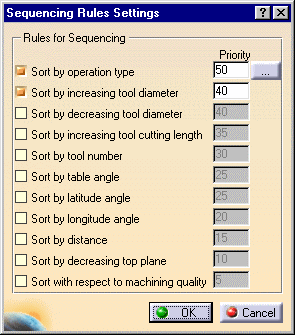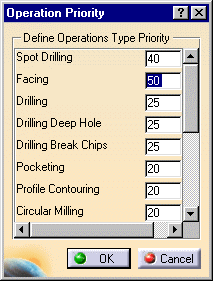|
|
This task shows how to optimize the order of operations in a program according to pre-defined sequencing rules. | ||
|
|
The Sequencing rules have been set
up by the administrator. The Program settings under Tools > Options >
Machining are described in
Program settings. Make sure that the document in the sequencing rules path is accessible in Read/Write. A sample sequencing rules document is delivered with the
product at the following location: |
||
|
|
1. | Create a program containing the
following operations.
|
|
| 2. |
Select
Rules Manager
|
||
 |
 |
||
| 3. |
Select
Auto Sequence
Click Apply to sequence the operations according to the defined rules and priorities. |
||
| 4. | The program is re-sequenced as follows.
|
||
|
|
You can click Undo if you want to cancel the auto-sequence results. | ||
| It is possible to impose a
constraint (called strong precedence) to force a group operations to
remain together after sequencing. Applying a strong precedence constraint means that in addition to imposing an order between two operations A and B, it is not possible to have another operation C between them. The sequence A - C - B is not allowed, only A - B is allowed if a strong precedence exists between A and B. For this, a parameter named For example, in auto-sequencing this could be used to prevent inserting a threading operation between a drilling operation and a reaming operation. Machining axis changes are taken into account in auto-sequencing without having to impose strong precedence criteria. |
|||
|
|
|||